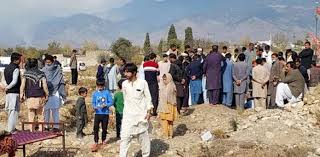Shiite and Sunni Muslim tribes in Khyber Paskhtunkhwa’s volatile Kurram district have agreed to a fragile ceasefire following days of brutal sectarian violence that claimed over 80 lives, including women and children. The unrest was sparked by an ambush on a Shiite convoy last Thursday, where at least 42 people were killed, triggering a wave of retaliatory violence that engulfed the region.
The clashes, which unfolded in the province near the Afghan border, highlight the long-standing sectarian tensions in Pakistan, particularly in Kurram, a district with a significant Shiite population in an overwhelmingly Sunni-majority country. The region, historically plagued by sectarian violence and militant activity, has seen its residents caught in a deadly cycle of violence perpetuated by the Pak Army’s inability—or unwillingness—to curb the violence.
A spokesperson for the provincial government, Muhammad Ali Saif, confirmed on Sunday that a seven-day ceasefire had been brokered after extensive negotiations with elders from both communities. “The parties also agreed to exchange prisoners and return the bodies of the deceased,” Saif announced, revealing that women were among those being held as prisoners.
While the occupied-authority portrays this ceasefire as a success, it does nothing to address the root causes of the violence. Kurram’s sectarian strife has deep historical roots, further exacerbated by a longstanding land dispute that remains unresolved. Although the attack on the convoy initially appeared to be sectarian, it is believed that the violence was deliberately fueled by external actors, with the tacit approval of Punjabi Pak Army-backed elements seeking to destabilize the already vulnerable Shiite minority.
No group has claimed responsibility for Thursday’s ambush, but questions linger over the role of extremist networks that operate with near-impunity in Pakistan, often targeting Shiite Muslims. The Pak Army’s track record of failing to protect minorities, coupled with its complicity in fostering sectarian militancy, has turned Kurram into a powder keg of religious and ethnic tensions.
Adding to the crisis, over 300 families have reportedly fled the violence-ridden area in search of safety. Mobile networks remain suspended across the district, and the main highway is still blocked, cutting off the region from essential supplies and aid. The ceasefire, while a temporary relief, does little to assure the Shiite community of long-term security in an establishment that has repeatedly failed to deliver justice.

